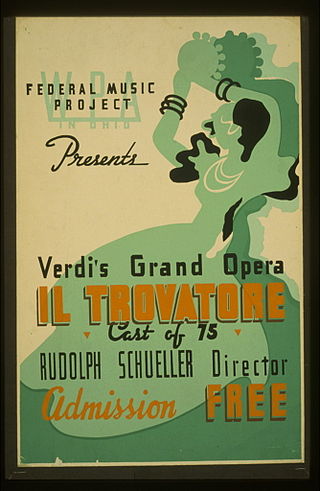
This is a list of notable events in music that took place in the year 1937.

Holiday Inn is a 1942 American musical film starring Bing Crosby and Fred Astaire, with Marjorie Reynolds, Virginia Dale, and Walter Abel. It was directed by Mark Sandrich with music by Irving Berlin. The composer wrote twelve songs specifically for the film, the best known being "White Christmas". The film features a complete reuse of the song "Easter Parade", written by Berlin for the 1933 Broadway revue As Thousands Cheer and used as a highlight of the 1948 film Easter Parade, starring Astaire and Judy Garland. The film's choreography was by Danny Dare.
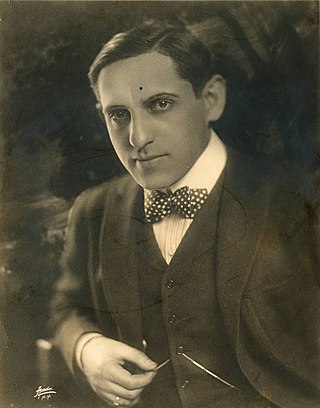
Gustave Edwards was an American composer, songwriter and film director. He also was a vaudevillian, organised his own theatre companies and was a music publisher.

John Francis Burke was an American lyricist, successful and prolific between the 1920s and 1950s. His work is considered part of the Great American Songbook.

"In My Merry Oldsmobile" is a popular song from 1905, with music by Gus Edwards and lyrics by Vincent P. Bryan.

Laurence Earl Crosby was the longtime publicity director of his younger brother, Bing Crosby, a manager, a philanthropist, an inventor, and an author. He was the eldest of Bing's six siblings.

Here Comes the Groom is a 1951 American musical romantic comedy film produced and directed by Frank Capra and starring Bing Crosby and Jane Wyman. Based on a story by Robert Riskin and Liam O'Brien, the film is about a foreign correspondent who has five days to win back his former fiancée, or he'll lose the orphans he adopted. Filmed from late November 1950 to January 29, 1951, the film was released in the United States by Paramount Pictures on September 20, 1951.
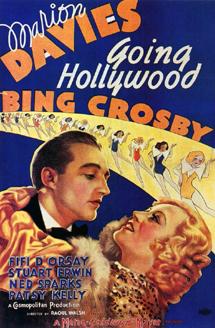
Going Hollywood is a 1933 American pre-Code musical film directed by Raoul Walsh and starring Marion Davies and Bing Crosby. It was written by Donald Ogden Stewart and based on a story by Frances Marion. Going Hollywood was released by Metro-Goldwyn-Mayer on December 22, 1933.

Bing: A Musical Autobiography was Bing Crosby's fourth Decca vinyl LP, recorded and released in 1954.

Star Spangled Rhythm is a 1942 American all-star cast musical film made by Paramount Pictures during World War II as a morale booster. Many of the Hollywood studios produced such films during the war, generally musicals, frequently with flimsy storylines, and with the specific intent of entertaining the troops overseas and civilians back home and to encourage fundraising – as well as to show the studios' patriotism. This film was also the first released by Paramount to be shown for 8 weeks.

Anything Goes is a 1936 American musical film directed by Lewis Milestone and starring Bing Crosby, Ethel Merman, Charles Ruggles and Ida Lupino. Based on the 1934 stage musical Anything Goes by Guy Bolton and P. G. Wodehouse, the stage version contains songs by Cole Porter.
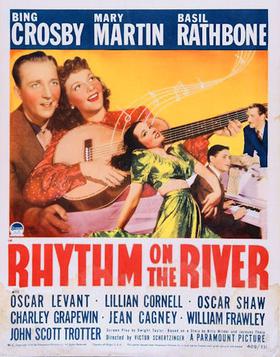
Rhythm on the River is a 1940 musical comedy film directed by Victor Schertzinger and starring Bing Crosby and Mary Martin as ghostwriters whose songs are credited to a composer played by Basil Rathbone. Crosby and Martin sang "Only Forever", for which James V. Monaco (music) and Johnny Burke (lyrics) were nominated for the Academy Award for Best Original Song.

If I Had My Way is a 1940 musical comedy film directed by David Butler and starring Bing Crosby and Gloria Jean. Based on a story by David Butler, the film is about a construction worker who takes charge of the daughter of a friend killed in an accident.

Top o' the Morning is a 1949 American romantic comedy film directed by David Miller and starring Bing Crosby, Ann Blyth, and Barry Fitzgerald. Written by Edmund Beloin and Richard L. Breen, the film is about a singing insurance investigator who comes to Ireland to recover the stolen Blarney Stone—and romance the local policeman's daughter.
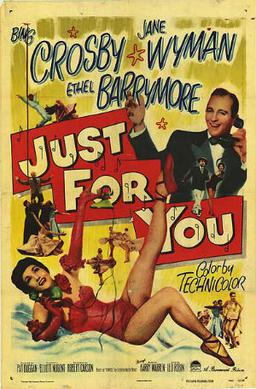
Just for You is a 1952 American musical film starring Bing Crosby and Jane Wyman and the final motion picture to be directed by Elliott Nugent. It was nominated for Best Song at the 1953 Academy Awards. The film was based on the book Famous by Stephen Vincent Benét. Filming took place between October 22 and December 20, 1951. It is said that Judy Garland had originally been sent a script as she was being considered for the female lead, but she apparently decided not to proceed with the project. Location scenes were filmed at Lake Arrowhead, near San Bernardino, California and at Big Bear Lake in the San Bernardino National Forest.

Welcome Stranger is a 1947 film directed by Elliott Nugent and starring Bing Crosby, Barry Fitzgerald, and Joan Caulfield. It was filmed in Hollywood with location shots at Munz Lakes during March to May 1946. Elliott Nugent appeared in one scene as a doctor sent to examine Barry Fitzgerald and that scene was directed by Billy Wilder.
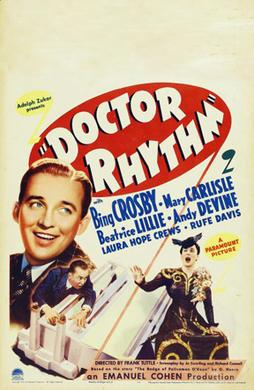
Doctor Rhythm is a 1938 American musical comedy film directed by Frank Tuttle and starring Bing Crosby, Mary Carlisle, Beatrice Lillie, and Andy Devine. Based on the 1907 short story The Badge of Policeman O'Roon by O. Henry, the film is about a doctor who pretends to be a policeman assigned as the bodyguard of a wealthy matron, whose beautiful niece becomes the object of his affections. The film features the songs "On the Sentimental Side" and "My Heart Is Taking Lessons".
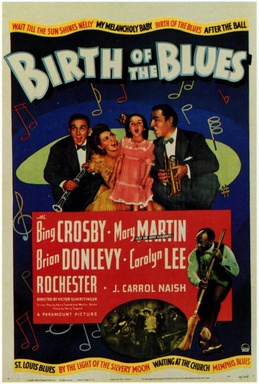
Birth of the Blues is a 1941 American musical film directed by Victor Schertzinger and starring Bing Crosby, Mary Martin and Brian Donlevy.
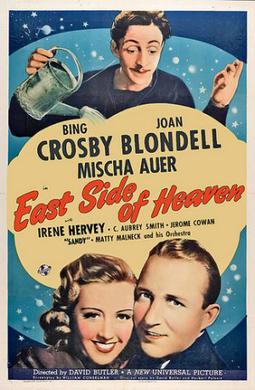
East Side of Heaven is a 1939 American musical film directed by David Butler and written by William M. Conselman and James V. Kern. The film stars Bing Crosby, Joan Blondell, Mischa Auer, Irene Hervey, C. Aubrey Smith, Robert Kent and Jerome Cowan. Filming took place in Hollywood from January 13 to March 7, 1939. The film was released on April 7, 1939, by Universal Pictures and had its New York premiere at Radio City Music Hall on May 4, 1939. This was another independent production in which Crosby had a financial interest.

Bing Crosby's Treasury – The Songs I Love is an LP set recorded in 1965 and issued by a mail-order firm, The Longines Symphonette Society, an educational service of the Longines-Wittnauer Watch Company.




















